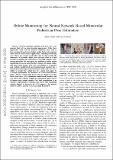Online Monitoring for Neural Network Based Monocular Pedestrian Pose Estimation
Author(s)
Gupta, Arjun; Carlone, Luca
DownloadAccepted version (592.1Kb)
Open Access Policy
Open Access Policy
Creative Commons Attribution-Noncommercial-Share Alike
Terms of use
Metadata
Show full item recordAbstract
© 2020 IEEE. Several autonomy pipelines now have core components that rely on deep learning approaches. While these approaches work well in nominal conditions, they tend to have unexpected and severe failure modes that create concerns when used in safety-critical applications, including self-driving cars. There are several works that aim to characterize the robustness of networks offline, but currently there is a lack of tools to monitor the correctness of network outputs online during operation. We investigate the problem of online output monitoring for neural networks that estimate 3D human shapes and poses from images. Our first contribution is to present and evaluate model-based and learning-based monitors for a human-pose-and-shape reconstruction network, and assess their ability to predict the output loss for a given test input. As a second contribution, we introduce an Adversarially-Trained Online Monitor (ATOM) that learns how to effectively predict losses from data. ATOM dominates model-based baselines and can detect bad outputs, leading to substantial improvements in human pose output quality. Our final contribution is an extensive experimental evaluation that shows that discarding outputs flagged as incorrect by ATOM improves the average error by 12.5%, and the worst-case error by 126.5%.
Date issued
2020-12Department
Massachusetts Institute of Technology. Laboratory for Information and Decision Systems; Massachusetts Institute of Technology. Department of Aeronautics and AstronauticsJournal
2020 IEEE 23rd International Conference on Intelligent Transportation Systems, ITSC 2020
Publisher
IEEE
Citation
Gupta, Arjun and Carlone, Luca. 2020. "Online Monitoring for Neural Network Based Monocular Pedestrian Pose Estimation." 2020 IEEE 23rd International Conference on Intelligent Transportation Systems, ITSC 2020.
Version: Author's final manuscript